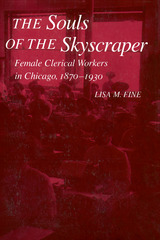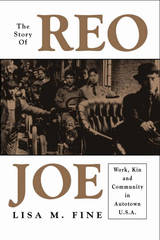2 books about Fine, Lisa

Souls Of Skyscraper
Lisa Fine
Temple University Press, 1990
"Fine's book adds to the debate over why the gender composition of the clerical labor force changed so quickly and completely."
--American Studies
During the late nineteenth century, a visitor to the city of Chicago would have looked in wonder at the many strange, new, and exciting sights: the nation's first skyscrapers, the bustling and congested streets, the large department stores, and the business girls. The Souls of the Skyscraper documents and explains the transformation of clerical work from a male to a female occupation amidst the industrialization and urbanization of the United States. Using literary, organizational, statistical, cinematic, and archival evidence primarily from Chicago, Lisa M. Fine explains the historical reasons why clerical work became women's work.
The appearance of the female clerical worker in the business office signaled two on-going developments: the simple shift of women entering and dominating office jobs that were previously held by men, and the changing gender definition of clerical work. This new opportunity for employment provided women with relatively well-paying and respectable jobs, even though the prestige of the clerical positions was devalued as more women were hired. While economic forces contributed to this process of occupational change, the vocational education of women, the availability of various types of social services such as group homes (e.g. the Eleanor Residences), and the evolving image of the working girl in the popular culture encouraged women to seek clerical positions.
Fine explores the realms where the gender definition of clerical work was discussed and negotiated: among technical experts, in the popular culture, in the prescriptions and actions of civic leaders, and in the private worlds of clerical workers themselves. In revealing the dynamics of change within the clerical sector, she enhances our understanding of occupational sex-typing.
[more]

Story Of Reo Joe
Work, Kin, And Community
Lisa M. Fine
Temple University Press, 2004
The Reo Motor Car Company operated in Lansing, Michigan, for seventy years, and encouraged its thousands of workers to think of themselves as part of a factory family. Reo workers, most typically white, rural, native-born Protestant men, were dubbed Reo Joes. These ordinary fellows had ordinary aspirations: job security, decent working conditions, and sufficient pay to support a family. They treasured leisure time for family activities (many sponsored by the company), hunting, and their fraternal organizations. Even after joining a union, Reo Joes remained loyal to the company and proud of the community built around it. Lisa M. Fine tells the Reo story from the workers' perspective on the vast social, economic, and political changes that took place in the first three quarters of the twentieth century. Lisa Fine explores their understanding of the city where they lived, the industry that employed them, and the ideas about work, manhood, race, and family that shaped their identities. The Story of Reo Joe is, then, a book about historical memory; it challenges us to reconsider what we think we know about corporate welfare, unionization, de-industrialization, and working-class leisure.
[more]
READERS
Browse our collection.
PUBLISHERS
See BiblioVault's publisher services.
STUDENT SERVICES
Files for college accessibility offices.
UChicago Accessibility Resources
home | accessibility | search | about | contact us
BiblioVault ® 2001 - 2024
The University of Chicago Press









